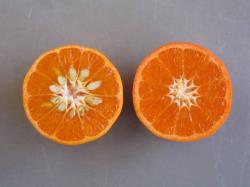Tango Mandarins Appear This Month In Produce Aisles
January 10, 2011 | 3 min to read

RIVERSIDE, Calif. – The first commercial crop of a new mandarin variety created by scientists at the University of California, Riverside will be harvested beginning later this month.
The fruit, called Tango, is the result of an induced mutation of W. Murcott mandarin. Originally from Morocco, W. Murcott mandarins have a deep orange color, easy-peel rind and tangy-sweet flavor – traits shared by the Tango. However, when W. Murcott mandarins are planted within five miles of other seed-bearing citrus – such as Clementine mandarins, lemons or grapefruit – they can be cross-pollinated by bees and become seedy. In contrast, the Tango is virtually seedless wherever it is grown.
“This is the most promising mandarin the university has ever produced,” said Mikeal Roose, a professor of genetics in the Department of Botany and Plant Sciences, who led the effort to develop the Tango.
The Tango mandarin was patented, and registered trees were established by the UC Citrus Clonal Protection Program. Distribution of budwood to citrus nurseries began in June 2006 and was limited exclusively to California growers for one year. Tango was introduced into Florida in 2007 and the trees were available internationally under exclusive licenses in 2009.
In all, 1.6 million Tango trees were sold to growers in California through March 2010. Tango trees may soon be available to home gardeners through retail nurseries.
The process used to produce the Tango – irradiating budwood of W. Murcott to induce a mutation – mimics nature’s manner of improving fruit. Radiation from the sun or natural errors during cell division can cause a single branch or fruit to mutate and develop unique characteristics, which scientists call a “sport.” (People have been reproducing favorable sports for generations. For example, all navel oranges are sports – natural mutations of oranges with seeds or other navel oranges.)
Tango is not a trademarked name, so the new seedless mandarin probably will be sold under existing grower brand names like Cuties and Delites. Before Christmas, fruit marketed as Cuties and Delites are early ripening Clementine mandarins. At the discretion of a UC-Tango licensee, the Tango, along with other non-UC mandarin selections, will likely be sold as Cuties and Delites when they ripen later this month, but some Tangos will show up in supermarkets and farmer’s markets under the Tango name.
“UC Riverside and the Office of Technology Commercialization are most proud of the Tango mandarin,” said Craig Sheward, the assistant vice chancellor for technology commercialization. “This seedless mandarin – superior in taste and feverishly being sought out by commercial citrus companies and growers – is a wonderful example of UCR’s world-class citrus breeding program. We believe the success of Tango will bring ripple benefits to California citrus growers and the people of California who have supported this program.”
The Tango was made possible by a UC and citrus industry partnership going back nearly 15 years. Roose and staff research associate Timothy Williams began field testing the fruit in 2001. The research and evaluation program was supported by the Citrus Research Board.
UCR has a long tradition in citrus research, with citrus production and development of new varieties being a major focus. The university is home to the University of California Citrus Variety Collection, consisting of two trees each of more than 1,000 different citrus types. Used extensively to solve citrus disease problems and improve commercial varieties, the collection is one of the world’s premier citrus germplasm collections.
Source: The University of California, Riverside
